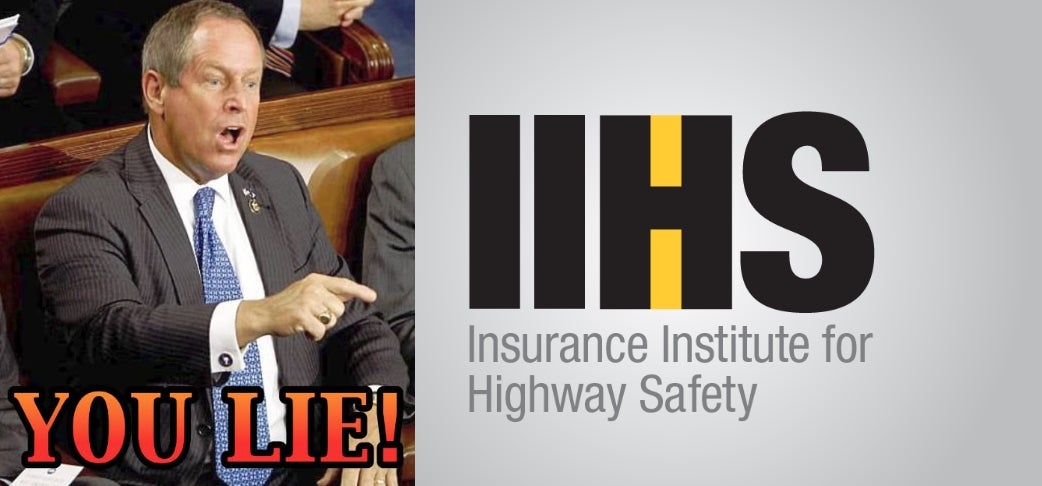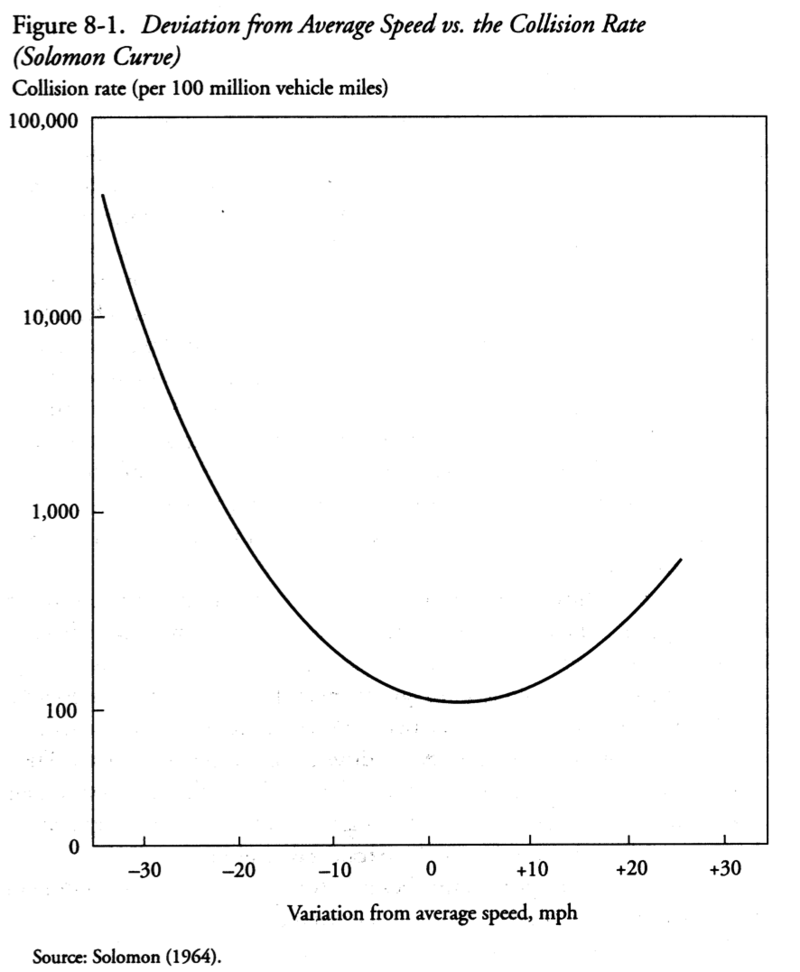 "cuts_off_prius" (cutsoffprius)
"cuts_off_prius" (cutsoffprius)
04/16/2016 at 23:46 • Filed to: None
 10
10
 8
8
 "cuts_off_prius" (cutsoffprius)
"cuts_off_prius" (cutsoffprius)
04/16/2016 at 23:46 • Filed to: None |  10 10
|  8 8 |

TL;DR The IIHS leaves out data that doesn’t fit their “Speed Kills” narrative, so we should take their “reports” with a grain of salt.
So IIHS does another “speed” kills report:
!!! UNKNOWN CONTENT TYPE !!!
By the same “researcher” whose 1998 “report” on speed limits was
BLASTED BY CATO!
!!!error: Indecipherable SUB-paragraph formatting!!!
(13. Charles M. Farmer, Richard A. Retting, and
Adrian K. Lund, “Changes in Motor Vehicle
Occupant Fatalities after Repeal of the National
Maximum Speed Limit,” Insurance Institute for
Highway Safety, December 1998.)
(page 16)
CATO quote:
The same problems contaminate the 1998 IIHS study. For example, the 1998 study excluded nine states with higher speed limits in 1995 and 1996. Of those nine states, Illinois had the second largest decline in fatality rate between 1995 and 1997, Iowa ranked fourth in largest overall decline, and Maryland ranked sixth.52 In fact, of the states that raised the speed limit, but were excluded from the 1998 IIHS study, the number of fatalities fell by 1.9 percent between 1995 and 1997 and the fatality rate fell by 5.9 percent. On balance, there is no basis in fact for the IIHS conclusion that repealing the maximum speed limit led to a 15 percent increase in fatalities. If there were any increase in deaths, it was probably one-tenth of that.
Why would you trust a report by IIHS who was ALREADY BUSTED OMITTING DATA! (Never mind that it was done by the same person “Farmer” in 1998!).
And here is the !!!error: Indecipherable SUB-paragraph formatting!!! response to the latest report:
The National Motorists Association, which lobbied for the repeal of the 55 limit, was not impressed by the quality of the latest IIHS research, saying it is nothing new.
‘Every few years, IIHS dusts off a ‘higher speed limits have killed tens of thousands of drivers’ report, mixes in more data, and inevitably comes to the same conclusion,” NMA President Gary Biller told TheNewspaper. “The problem the Insurance Institute has is that there are several instances –- Utah increasing I-15 speed limits to 80 MPH in 2009 and Ohio going from 65 to 70 MPH in 2011 are just two examples -– where the years following higher limits were some of the safest on record for those states.’
‘The dilemma for the insurance industry is that despite the high speeds, traffic fatalities are at record lows. For 2014, the fatality rate per hundred million miles traveled was 1.01, less than half the 2.1 fatality rate in 1990 when the national speed limit was in place.’
http://www.thenewspaper.com/news/49/4939.a…
How does IIHS define speeding?
“Based on a nationally representative sample of police-reported crashes, speeding, including exceeding the speed limit, driving too fast for conditions or racing, was involved in 12 percent of property damage crashes and 16 percent of crashes with injuries or fatalities.”
http://www.readingeagle.com/news/article/s…
So the IIHS definition of “speeding’ is:
1. ILLEGAL street racing.
2. Driving too fast for conditions BELOW THE SPEED LIMIT (many cases under 55 too).
3. Any crash ABOVE the speed limit REGARDLESS of cause.
What does the Insurance Institute for Highway Safety (IIHS) gain from lobbying for lower speed limits?
IIHS member companies rake in millions in dollars in surcharges from speeding tickets. If speed limits are set well below the prevailing travel speeds (which IIHS apparently wants), then there will be more speeding tickets. More speeding tickets = more profit for insurance companies.
But don’t people drive even faster with higher speed limits?
There’s a lot of misconceptions on speed limits out there. Numerous studies show that when speed limits are raised or lowered, travel speeds hardly change.
In fact, here are the findings summarized from a national study sponsored by the US DOT and FHWA with data from 22 states on the effect of raising and lowering speed limits:
The results of the study indicated that
lowering posted speed limits by as much as 20 mi/h (32 km/h), or raising speed limits by as much as 15 mi/h (24 km/h)
had little effect on motorist’ speed
. The majority of motorist did not drive 5 mi/h (8 km/h) above the posted speed limits when speed limits were raised, nor did they reduce their speed by 5 or 10 mi/h (8 or 16 km/h) when speed limits are lowered. Data collected at the study sites indicated that
the majority of speed limits are posed below the average speed of traffic
.
Lowering speed limits below the 50th percentile does not reduce accidents
, but does significantly increase driver violations of the speed limit. Conversely,
raising the posted speed limits did not increase speeds or accidents
.
https://www.ibiblio.org/rdu/sl-irrel.h…
And here’s what Lt. Gary Megge , former Head of Traffic Services from the Michigan State Police tells us:
When we raise a speed limit, traffic speed does not automatically increase. That’s a myth. I’ve been doing this 15 years and raised 300 speed limits, and never have we seen or observed a wholesale increase in traffic speeds. It’s a very counter-intuitive idea. But the science and engineering works. We want to ensure it’s safe and fair to the public.
http://www.mlive.com/politics/index…
So if drivers disregard the speed limit, why bother trying to set the “right” speed limit at all?
One reason is that a minority of drivers do follow the speed limit . “I’ve found that about 10% of drivers truly identify the speed limit sign and drive at or near that limit,” says Megge. Since these are the slowest share of drivers, they don’t affect the 85th percentile speed. But they do impact the average speed — by about 2 or 3 mph when a speed limit is changed , in Lt. Megge’s experience — and, more importantly, the variance in driving speeds.
This is important because, as noted in a
!!!error: Indecipherable SUB-paragraph formatting!!!
,
“the potential for being involved in an accident is highest when traveling at speed much lower or much higher than the majority of motorists.”
If every car sets its cruise control at the same speed, the odds of a fender bender happening is low. But when some cars drive 55 mph and others drive 85 mph, the odds of cars colliding increases dramatically. This is why getting slow drivers to
!!!error: Indecipherable SUB-paragraph formatting!!!
is so important to roadway safety;
we generally focus on joyriders’ ability to cause accidents
— and rightly so —
but a car driving under the speed limit in the left (passing) lane of a highway is almost as dangerous.
http://priceonomics.com/is-every-speed…
This can be confirmed by the Solomon Curve, aka the crash risk curve.

According to the Solomon Curve, crash risk increases dramatically as you travel more slowly from the prevailing speed. Those 10% of drivers who actually follow an underposted speed limit therefore are at a greater risk of getting into a crash than, say, someone driving 5-10 mph faster than the prevailing speed (which is usually over the speed limit).
So deaths are not really caused by higher speed limits? What causes them then?
It’s a mix of factors. Let’s hear from someone qualified who has been on the ground:
“I’ve spent eight years in traffic services, and I was a crash reconstructionist for five years before that, so I’ve seen my share of fatal wrecks, and I can tell you:
Deaths are not caused by speeding. They’re caused by drinking, drugs and inattentiveness. The old adage that speed kills just isn’t realistic. The safest speed is the speed correct for that roadway at a given time.
A lot of speed limits are set artificially low.”
- Lieutenant Gary Megge, Michigan State Police, Former Head of Traffic Services
 Eric @ opposite-lock.com
> cuts_off_prius
Eric @ opposite-lock.com
> cuts_off_prius
04/16/2016 at 23:56 |
|
The only accident I have been involved in that was blamed on me fell into the second category (too fast for conditions), which is technically true, but claiming it was caused by speed is like claiming earthquakes have nothing to do with falling bricks killing people.
 Eric @ opposite-lock.com
> cuts_off_prius
Eric @ opposite-lock.com
> cuts_off_prius
04/17/2016 at 00:02 |
|
Oh yes: I love the speed limits in rural UT. I drive basically as fast as I want and nobody bothers me. The speed limits are so high that people actually follow the stay right rule, too.
 My bird IS the word
> cuts_off_prius
My bird IS the word
> cuts_off_prius
04/17/2016 at 00:09 |
|
Its a rediculous argument to make anyway. If we all drove around at 15 mph, no one would ever die. ever. But then NOONE WOULD GET ANYTWHERE. Speed does kill, but so does driving poorly. Anywho, being alive comes with a 100% chance of dying so I don’t understand why everyone is so scared of it.
 Blunion05 drives a pink S2000 (USER WAS BANNED FOR THIS POST)
> My bird IS the word
Blunion05 drives a pink S2000 (USER WAS BANNED FOR THIS POST)
> My bird IS the word
04/17/2016 at 02:51 |
|
Yep. Slow traffic results in MORE traffic and has a compounding effect. There’s no reason to not have speed limits raised. Cars on average are becoming more fuel efficient at higher speeds.
 That's gonna leave a mark!
> cuts_off_prius
That's gonna leave a mark!
> cuts_off_prius
04/17/2016 at 06:16 |
|
Unfortunately this type of activity has become standard operating procedure, and I’m not just talking about where $ are at stake. The end justifies the means has become the norm. If we don’t have the data we can still make it say what we want with a little fudging. Makes it hard to accept any report just on its face regardless if it is a private, quasi governmental or government report.
 jcwconsult
> That's gonna leave a mark!
jcwconsult
> That's gonna leave a mark!
04/17/2016 at 13:26 |
|
The IIHS should be known as the Insurance Institute for Higher Surcharges. They lobby for the lowest posted limits the public will stand for - to create more speed traps, for more speeding tickets to safe drivers going along with the normal flow speeds, so they can issue high insurance premium surcharges to safe driving ticket victims, the ones with the lowest crash risks, because those surcharges become almost pure profits. It is an immoral racket that NO ONE should tolerate.
James C. Walker, Life Member - National Motorists Association
 Dugg-117
> My bird IS the word
Dugg-117
> My bird IS the word
04/17/2016 at 22:32 |
|
Speed doesn’t kill. Suddenly stopping does.
 My bird IS the word
> Dugg-117
My bird IS the word
> Dugg-117
04/17/2016 at 23:04 |
|
DAMN YOU ISAAC NEWTON!